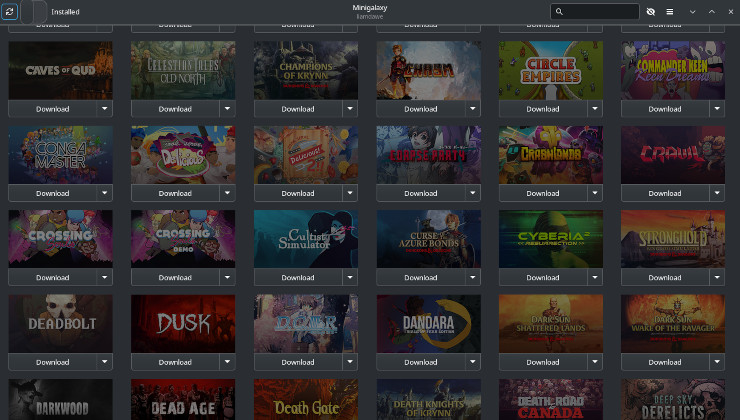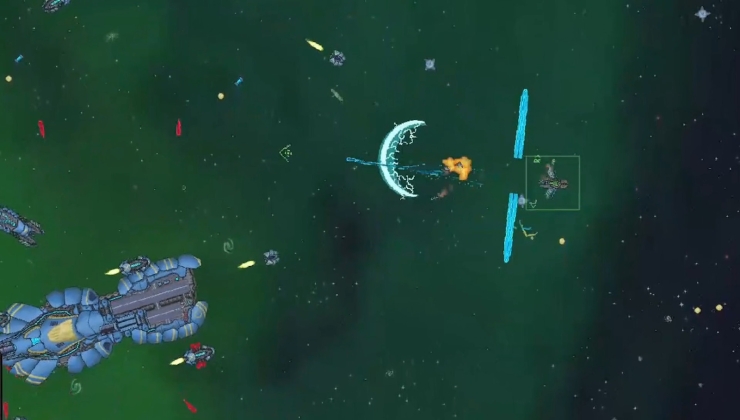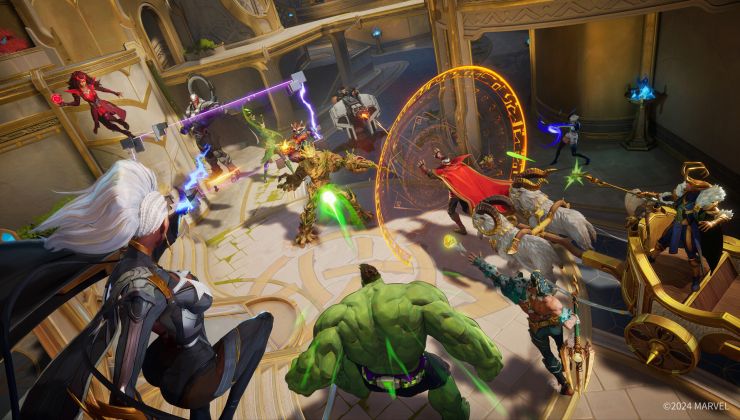Stadia is something we don't really talk about here too much now, as Google has let it slide considerably from the original aim but it's still going and it seems Google still has some interesting plans for it.
There's an upcoming Google For Games Dev Summit on March 15, which includes Android and Stadia. For the Stadia service that runs on Debian Linux, Google has a few talks including "Play Testing Made Easy on Stadia", "Stadia Adventures in slow server code on Unity" and "Profiling on Stadia" but the perhaps bigger one is titled "How to write a Windows emulator for Linux from scratch?" that notes:
Detailed overview of the technology behind Google's solution for running unmodified Windows games on Stadia. This is a deep technical walkthrough of some of the core concepts with the goal to allow curious programmers to better understand such technologies and potentially to build their own.
We don't know yet if it will be open source but the bigger question perhaps is why they didn't go with all the existing code that has already proven itself? We are of course talking about Wine / Proton, DXVK and VKD3D-Proton which powers Windows games on Linux desktop and the Steam Deck. It's already shown to have great performance.
It's an obvious move for Stadia though to help increase the game library, the same reason Valve created Proton from Wine to bring more games to Linux systems. We'll be taking a look over the talk on March 15 and will make some notes for you.
Wine originally stood for WINdows Emulator ...
I didn't know this history behind the acronym and always wondered why it "is not" an emulator, so thanks for this.
EDIT: reading further down on the thread I'm back to being confused about it
Last edited by anewson on 11 Mar 2022 at 2:47 am UTC
reading further down on the thread I'm back to being confused about it
Wine emulates Windows, so it is an emulator of it. But some can't understand the term except in the context of emulating hardware, so they probably insisted that "Wine is not an emulator [of hardware]". I don't really care about their issue and have no problem with calling Wine an emulator [of software, namely Windows].
Last edited by Shmerl on 11 Mar 2022 at 2:57 am UTC
reading further down on the thread I'm back to being confused about it
Wine emulates Windows, so it is an emulator of it. But some can't understand the term except in the context of emulating hardware, so they probably insisted that "Wine is not an emulator [of hardware]". I don't really care about their issue and have no problem with calling Wine an emulator [of software, namely Windows].
So, should we say that Linux is a system V emulator as well?
So, should we say that Linux is a system V emulator as well?
Not really, since it directly implements interfaces to be used as system ones. Wine emulates Windows interfaces through Linux ones.
Last edited by Shmerl on 11 Mar 2022 at 4:16 am UTC
So, should we say that Linux is a system V emulator as well?
Not really, since it directly implements interfaces to be used as system ones. Wine emulates Windows interfaces through Linux ones.
Emulates vs implements. That's the discussion, and Wine also implements WinAPI a windows subsystems on Linux. My point is that you are using a very broad definition for emulation, and by it you should also call virtual machines (or even docker) emulators.
I don't see a discussion in this really and any issue with using a broad meaning of emulates. No one said emulates only can refer to hardware, except for some who decided to limit the meaning for some weird reason.
Nobody said anything about hardware except you.
And no WINE is not a OS emulator, it's a reimplementation of the Windows API. Not really sure how a emulator for a modern OS would look like but perhaps this one from Google is. Perhaps they emulate it down to how e.g the Windows Scheduler works to make games get the 100% Windows experience that WINE can never do.
This. A Windows emulator would have to behave like Windows in more ways than offering its API. Because Windows is more than an API.
Nobody said anything about hardware except you.
Not true. All those who got hung up on "Wine is not an emulator" were busy defining emulator as something that has to emulate CPU architecture and such. While the meaning of the word emulate never had to be limited to what they wanted.
Nobody said anything about hardware except you.
Not true. All those who got hung up on "Wine is not an emulator" were busy defining emulator as something that has to emulate CPU architecture and such. While the meaning of the word emulate never had to be limited to what they wanted.
You've got the whole thread at your disposal to cite all those. Nobody here was defining it this way, and you ignored - and are still ignoring - all arguments that actually were given.
Wine is not a Windows emulator, because it does not provide a Windows environment: it does not allow using of Windows drivers, does not emulate devices, or network interfaces that would normally be found on a Windows system, etc. That is why most software that interacts with hardware will not work in Wine. Also why anticheat and DRM software does not work.
It's much more like what Mono is to .NET, or like Pipewire to Pulseaudio, or like FNA to XNA, or DXVK to DirectX, etc. They implement the same API, which allows to use them interchangeably without modifying the clients. At least in theory you could write a native Linux application against Wine API and there would be no emulation involved.
But API itself is not quite enough to trick actual Windows applications. That is why Wine does indeed emulate parts of Windows, like filesystem structure and drive names. And the Wineserver process provides roughly the same services as a Windows kernel would.
Wine is largely not an emulator, but has some traits of an emulator. Just enough emulation sprinkled on top to make us nerds worldwide argue over nomenclature.
You've got the whole thread at your disposal to cite all those. Nobody here was defining it this way,
And I'm not talking about people here, but about those who were originally annoyed at Wine calling itself an emulator, causing it to be rebranded as "not an emulator". So not sure what your point is exactly. None of these people are here I presume.
You've got the whole thread at your disposal to cite all those. Nobody here was defining it this way,
And I'm not talking about people here, but about those who were originally annoyed at Wine calling itself an emulator, causing it to be rebranded as "not an emulator". So not sure what your point is exactly. None of these people are here I presume.
You've been explicitly talking about the present:
Wine emulates Windows, so it is an emulator of it. But some can't understand the term except in the context of emulating hardware, so they probably insisted that "Wine is not an emulator [of hardware]".
Windows consists of a lot of things, including but absolutely not limited to...
[ ] API
[ ] ABI
[ ] Scheduler
[ ] Memory manager
[ ] Kernel
[ ] File handling
[ ] Drivers
[ ] User interface
[ ] ... you name it.
Most of this is not - at all - handled by WINE, and therefore, WINE is not a Windows emulator, and will never be.
Last edited by Eike on 11 Mar 2022 at 9:00 pm UTC
Emulation can mean emulating software. Those who don't like this or don't get it can move along. Arguing with them is a complete waste of time.
Last edited by Shmerl on 11 Mar 2022 at 9:03 pm UTC
It's much more like what Mono is to .NET, or like Pipewire to Pulseaudio, or like FNA to XNA, or DXVK to DirectX, etc. They implement the same API, which allows to use them interchangeably without modifying the clients. At least in theory you could write a native Linux application against Wine API and there would be no emulation involved.
But API itself is not quite enough to trick actual Windows applications.
To deviate even further: I found news group postings from '93 where they call it "WINDOWS API emulator" - but isn't it technically the ABI, not the API, they're... whatevertheyredoingwithit?
Emulation can mean emulating software. Those who don't like this or don't get it can move along. Arguing with them is a complete waste of time.
This is still nothing anybody here has been saying around here. That's why the discussion doesn't work. Arguing would need to deal with the actual arguments given, which you're not doing today.
Again, for your reading pleasure:
Windows consists of a lot of things, including but absolutely not limited to...
[ ] API
[ ] ABI
[ ] Scheduler
[ ] Memory manager
[ ] Kernel
[ ] File handling
[ ] Drivers
[ ] User interface
[ ] ... you name it.
Most of this is not - at all - handled by WINE, and therefore, WINE is not a Windows emulator, and will never be.
(You see? Nothing about hardware, nothing about there would be no possibility to emulate software.)
Last edited by Eike on 11 Mar 2022 at 9:11 pm UTC
Last edited by Shmerl on 11 Mar 2022 at 9:12 pm UTC
Good, then what are you even arguing about? If discussion doesn't work for you, don't engage in discussion :)
It work's as soon as you're going to read, understand and answer my argument. WINE cannot be a Windows emulator because it doesn't intent to emulate Windows, which is way more than an API/ABI.
don't engage in discussion posting flame comments that are simply false :)
Show me where I'm flaming. Cite.
Last edited by Shmerl on 11 Mar 2022 at 9:15 pm UTC








 How to set, change and reset your SteamOS / Steam Deck desktop sudo password
How to set, change and reset your SteamOS / Steam Deck desktop sudo password How to set up Decky Loader on Steam Deck / SteamOS for easy plugins
How to set up Decky Loader on Steam Deck / SteamOS for easy plugins
See more from me